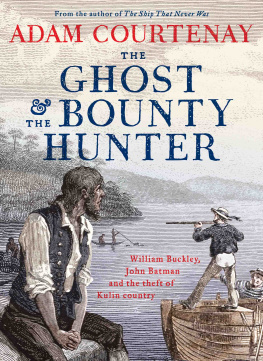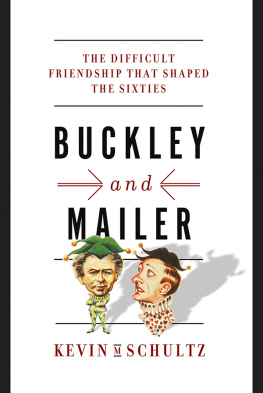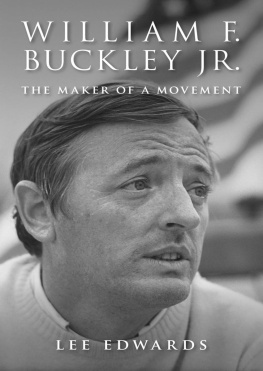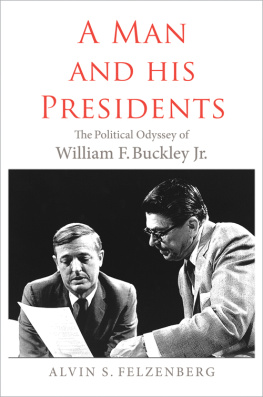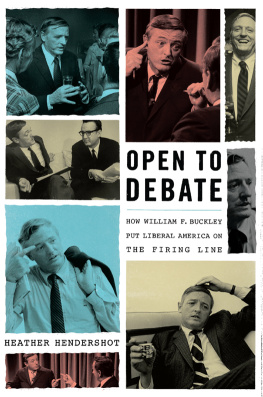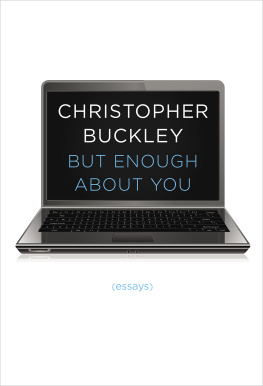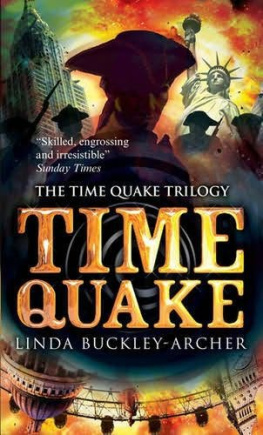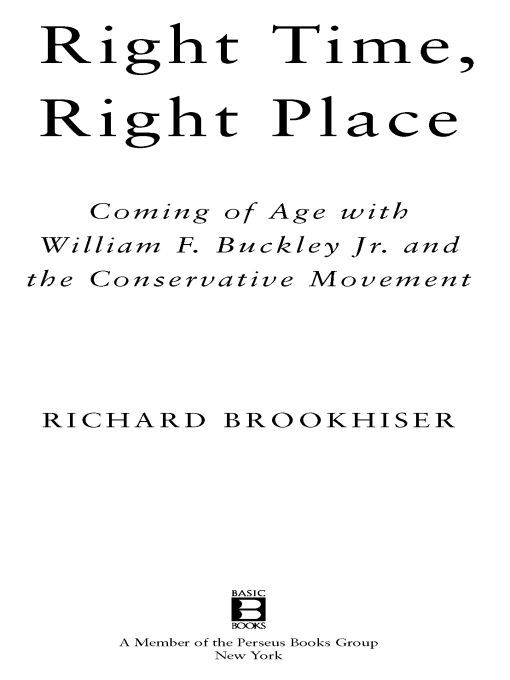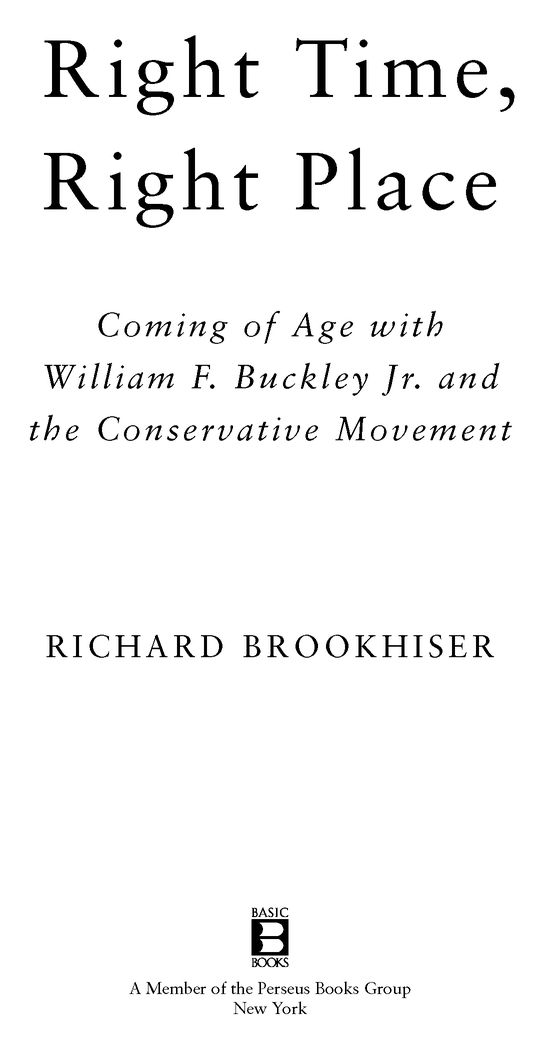Table of Contents
ALSO BY RICHARD BROOKHISER
The Outside Story:
How Democrats and Republicans Re-Elected Reagan
The Way of the WASP:
How It Made America, and How It Can Save It... So to Speak
Founding Father: Rediscovering George Washington
Rules of Civility: The 110 Precepts That Guided
Our First President in War and Peace
Alexander Hamilton, American
Americas First Dynasty: The Adamses 1735-1918
Gentleman Revolutionary:
Gouverneur Morris, The Rake Who Wrote the Constitution
What Would the Founders Do? (Our Questions, Their Answers)
George Washington on Leadership
FOR
Terry Teachout
Bliss was it in that dawn to be alive,
But to be young was very Heaven!
WILLIAM WORDSWORTH
Never glad confident morning again!
ROBERT BROWNING
Acknowledgments
Lou Cannon refreshed my memory of the 1984 cycle.
I would like to thank my editor, Lara Heimert, and my agent, Michael Carlisle.
My wife, Jeanne Safer, urged me to dig deeper, as she always does.
INTRODUCTION
WILLIAM F. BUCKLEY JR. (1925-2008) changed the world. I was at his side during the years the world noticed it. George Will once said, Without Buckley, no National Review [the magazine he edited for twenty-five years]; without National Review, no conservative takeover of the Republican party; without that, no Reagan; without Reagan, no victory in the Cold War. I came into Bill Buckleys life in 1969, halfway through that march of accomplishments. I came of age, and middle age, along with the conservative movement that he midwifed. He was my boss and my mentor. He discovered me, tapped me as his heirand then changed his mind. I had to find a new voice, as a writer and a historian, while both of us reconfigured our relationship, and while the world changed again, in ways nobody had predicted.
This is my story of a remarkable man. Bill Buckley was a famous manat the top of his game, he was at the top of the world. His television show aired in a hundred markets, his syndicated column ran in hundreds of newspapers, his books appeared regularly on the best-seller list. Presidents and movie stars hobnobbed with him, world-famous musicians performed in his living room, comics imitated him. Much of that slipped away as he aged and tired, but when he died he was treated as a fallen head of state. If Im still famous, he had instructed his son about his funeral, ask the cardinal to hold it in St. Patricks; otherwise, tuck me away in Sharon, the familys Connecticut home. The memorial mass was in St. Patricks, with 2,200 mourners.
He was also vital. What he liked he loved, and what he loved he had to share with colleagues, friends, and casual acquaintances. His delight was a boys, even when the taste was a connoisseurs and the judgment a mans. At the end of one of his books about sailing, the onboard representative of the owner of the yacht he has rented tells him there is some weakness in the mast, he should let up on the last leg. Bills attitude is, thats the owners problem; I rented the boat, were in the Atlantic Ocean with a good wind, let her rip. He brought that avidity of appreciation to ideas, words, music, food, gadgets; to his friendships.
THIS IS ALSO my story of the conservative movement, and of the world in which it came to power, with the potential for accomplishments and the certainty of failure that power entails. In the age of Obama, conservatism is in retreatthough perhaps its retreat began with Bill Clinton, or the Bushes, father and sonbut it will be back, and its ups and downs are of interest to conservatives, their enemies, and ordinary Americans. When I met Bill Buckley, there were still Soviet troops in Berlin. Ten years later, they were in Afghanistan. Ten years after that, the Berlin Wall collapsed. Twelve years after that, the World Trade Towers collapsed. The conservative movement helped elect presidents, from Richard Nixon to Ronald Reagan to George W. Bush. Like a typhoon, the turn of the millennium threw amazing sea creatures on the beach: prophets (Aleksandr Solzhenitsyn), freaks (Monica Lewinsky), monsters (Pol Pot). Working for Bill Buckley at National Review, I covered these and many other figures and events. I shook Castros hand; Reagan laughed at one of my jokes, and Margaret Thatcher repeated it. One of my friends got anthrax after 9/11. You had to be interested in history from 1969 to 2008; to borrow a line from Christopher Hitchens, it was interested in you.
THIS IS, FINALLY, my story of a relationship. Bill was a generous and devoted man; he was also willful, capricious, impulsive. The former qualities generally prevailed over eruptions of the latter, but the latter could give you a wild ride. I went on a number. One fine day he announced that I would succeed him; another, he announced that I would not (there were other little surprises in store besides those). I was the more susceptible because I was thirty years younger than he was, because I was looking for someone to look up to, because it took me thirty years to realize that friendship is one of the few solid things you can have in this world, and rare enough.
The story includes the teller of the story. When I met Bill Buckley I was a teenagera young man from the provinces. In forty years I have fallen in love many timeswith writing, with Bill and his magazine, with my wife, with a man who has been dead for two hundred years (though he is still alive). I am unusually impressionable, and I keep better-than-average track of my impressions. They are the substance of my life, and the medium of this book.
This story is especially for the young. Those who are too young to remember Buckley will meet an arresting and significant figure; they may also learn, from the evolutions of my career, some points of use for their own. My life has not been quite what I expected it to be, but then nothing ever is; we make the best of new opportunities. Finding your own place in the world is a neat trick. I offer my experiences as stimulus and guidance.
CHAPTER 1
I MET BILL Buckley by writing for him.
I grew up in Irondequoit, New York, a suburb of Rochester, a midsize upstate city, with my parents and my older brother, Bob. We lived in a ranch house on a half-acre lot in a tract of other postwar houses that had been developed in a former peach orchard. Dad worked, Mom was the mother, Bob and I were smartthat was the family division of labor.
In the fall of 1969 I was a freshman in the local public high school (I didnt know anybody who went to private ones); my brother was a junior at Yale. Every weekend of the school year since he had gone away to college I wrote him, on a small black metal typewriter that had belonged to Mom, a letter rehearsing the events of the weekbasketball games, school plays, little triumphs, tiny disasters, bulletins of adolescence dramatized and ironized. I wrote to inform him: He knew many of the repeating charactersparents, teachers, friends of mine who were younger siblings of friends of his. But mostly I wrote to portray myself, to Bob, and to my parents, to whom I read the letters aloud (like an out-of-town preview) before mailing them off.


